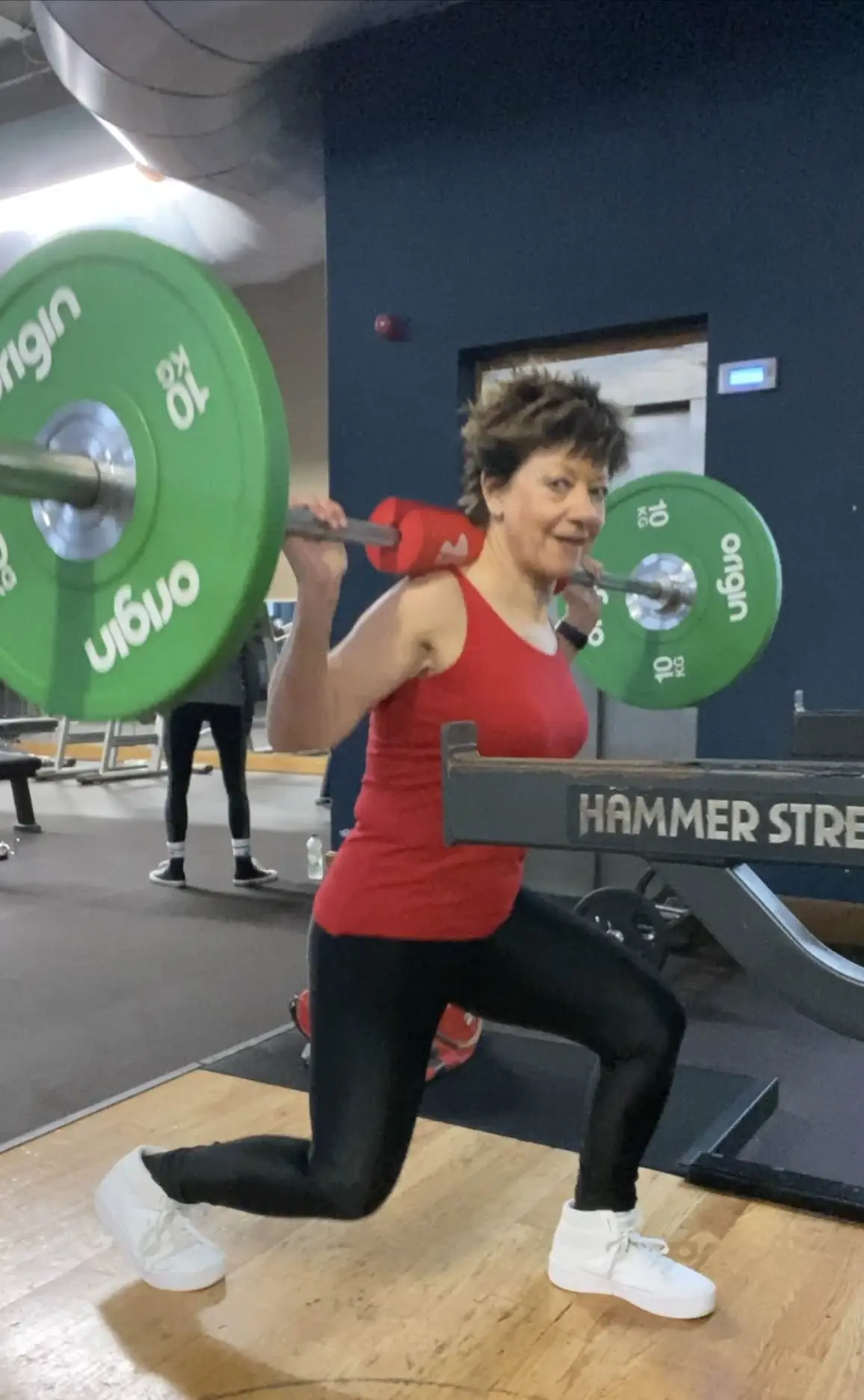“WHY YOU SHOULD LIFT WEIGHTS”


Why You Should Strength Train
Strength training is important at any age but a lot more so when you reach 60. It could make the difference between remaining independent or becoming dependent as you age.
If you’ve never done strength training before this workshop is definitely for you. If you’re already lifting weights as part of your regular exercise routine then I’d also recommend that you sign up to make sure that your current programme is appropriate for your age and lifestyle.
Sarcopenia is a disease where your muscles shrink, become weak and make it difficult for you to carry out your activities of daily living.
Nearly 40% of women over 60 have sarcopenia
Make sure this doesn’t happen to you.
You can avoid this happening to you by doing strength training on a regular basis. It’s never too late to start – but the sooner you start, the better your results.
Why not take the 20-minute Sarcopenia Assessment. Three simple exercises to check whether you’re as strong as you should be to avoid this disease. Click HERE to view my client, Mary, taking this Assessment. Mary has been training with me for the past 5 years and passed her Sarcopenia Assessment with flying colors.
Why I Strength Train

I realised from an early age that I could get more out of life by staying strong and fit. I first set foot in a gym in 1985 and have been using strength training equpment ever since. This keeps my muscles, joints and bones strong and also prevent fat gain and injury.
Strength training has been so important to me that I travelled to many international fitness and personal training conventions to learn from the best Personal Trainers and Exersize Scientists in the industry.
When I turned 60 I realised just how much more important it was to maintain strong muscles if I intended to maintain the quality of my life through my 70’s, 80’s and beyond (hopefully!).
Today, I strength train 3 times a week. This enables me to live an active life where I can enjoy a variety of activities without worrying that I’m too weak and without sustaining injuries. This includes handling my 200kg motorbike, snowboarding in the Alps and weekend hikes camping in Cumbria.
FAQs
Q: Is it safe for people over 60 to engage in strength training?
A: Yes, strength training can be safe and beneficial for people over 60. It helps improve muscle strength, bone density, balance, and overall functional ability. However, it is advisable to consult with a healthcare professional before starting any new exercise program, especially if you have any underlying health conditions.
Q: What are the benefits of strength training for older adults?
A: Strength training offers several benefits for older adults, including increased muscle strength and mass, improved bone density, enhanced balance and stability, better joint flexibility, increased metabolism, and a reduced risk of falls and fractures.
Q: Can strength training help improve bone health in older adults?
A: Yes, strength training is known to improve bone health in older adults. By placing stress on the bones through resistance exercises, it stimulates bone remodeling and helps increase bone density, reducing the risk of osteoporosis and fractures.
Q: How often should older adults engage in strength training?
A: Older adults should aim to engage in strength training exercises at least two to three times per week. It is important to allow for adequate rest and recovery between sessions to prevent overexertion.
Q: What types of exercises are suitable for older adults engaging in strength training?
A: Older adults can benefit from a variety of strength training exercises, including bodyweight exercises (such as squats, lunges, and push-ups), resistance band exercises, weightlifting, and using weight machines. It is important to choose exercises that target major muscle groups and focus on proper form and technique.
Q: Should older adults use weights when strength training?
A: Yes, using weights can be beneficial for older adults during strength training. It can be in the form of bands, dumbbells, barbells, or weight machines. However, it is crucial to start with lighter weights/resistance and gradually progress to heavier loads to ensure proper form and minimize the risk of injury.
Q: Can strength training help with weight management in older adults?
A: Yes, strength training can aid in weight management for older adults. It helps increase muscle mass, which in turn raises the resting metabolic rate. This means that even at rest, the body burns more calories, making it easier to maintain a healthy weight or lose excess weight when combined with a balanced diet.
Q: Are there any precautions older adults should take before starting strength training?
A: Before starting strength training, older adults should consult with their healthcare provider, especially if they have any pre-existing health conditions and then employ a Personal Trainer for an individualised programme. It is important to start with lighter weights and focus on proper form to avoid injuries. Warm-up exercises and stretching are also recommended before each session.
Q: How can older adults prevent injuries during strength training?
A: To prevent injuries during strength training, older adults should focus on proper form and technique. Gradually progress in terms of weight and intensity, and avoid using weights that are too heavy. It is also important to listen to the body, take rest days when needed, and address any pain or discomfort promptly.
Q: Can strength training help improve mobility and flexibility in older adults?
A: Strength training can improve mobility in older adults by keeping the muscles strong. Flexibility is maintained by stretching after strength training.
Q: Can strength training have cardiovascular benefits for older adults?
A: Strength training primarily focuses on improving muscle strength, For significant cardiovascular benefits, combining strength training with aerobic exercises is recommended.
Q: How long does it take to see results from strength training for older adults?
A: If you train on a regular basis, you’ll notice feeling stronger almost immediately. You will begin to look more toned after 4-6 weeks.
